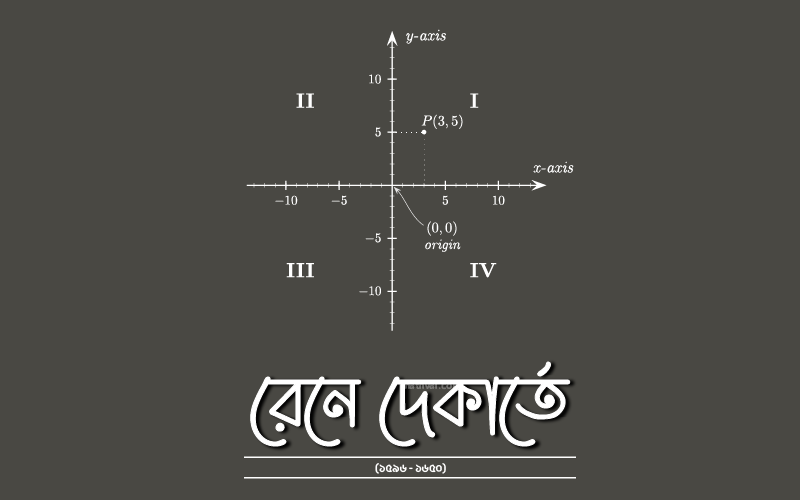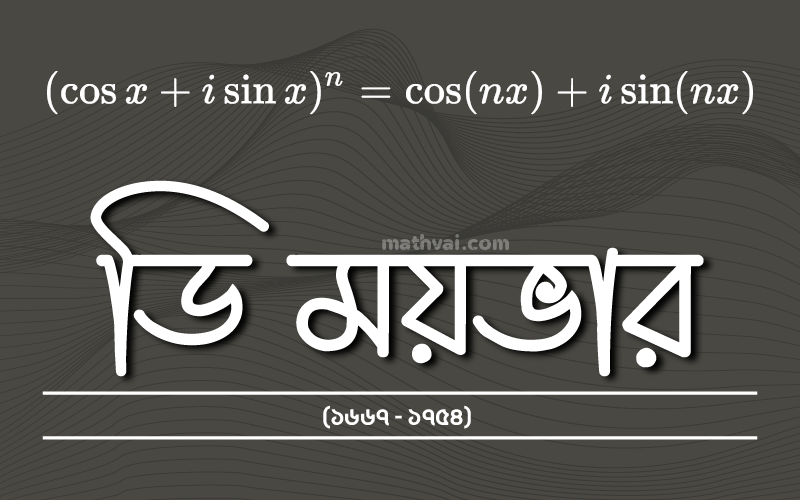ম্যাথ পোস্টার ও ভিজুয়াল ম্যাথ
download High Resolution math poster & visuals created by your "Math Vai".
Latest blogs

Created by - Tanvir Rony
Brahmagupta
Brahmagupta, an influential mathematician and astronomer of ancient India, left an enduring legacy that shaped the development of mathematics. Born in 598 CE in the city of Ujjain, Brahmagupta made remarkable contributions to mathematics, particularly in the field of algebra and number theory. His most significant work, the "Brahmasphutasiddhanta," was a monumental treatise on mathematics and astronomy. This text not only explored various mathematical concepts but also provided insights into astronomy, including the movement of celestial bodies. One of Brahmagupta's most profound contributions was his understanding and formalization of zero. He introduced the concept of zero as a numerical digit and demonstrated its use as a placeholder in mathematical calculations. This revolutionary concept was a pivotal moment in the history of mathematics, transforming arithmetic and algebra. Brahmagupta's work laid the foundation for the decimal system and positional notation, allowing for more sophisticated mathematical computations. Moreover, Brahmagupta made significant advancements in algebra, particularly in solving quadratic equations. He presented explicit solutions for quadratic equations with both positive and negative roots, introducing methods that greatly influenced later mathematicians. Beyond mathematics, Brahmagupta's contributions extended to astronomy. His understanding of celestial movements and astronomical calculations had a profound impact on the field, influencing later astronomers and their work. Brahmagupta's legacy as a mathematician and astronomer remains profound, shaping the course of mathematical development in India and beyond. His pioneering work in introducing zero as a numerical digit and its implications for mathematics laid the groundwork for modern mathematical concepts. Brahmagupta's influence reverberates through the annals of history, marking him as a pivotal figure in the evolution of mathematical thought and the development of algebra and arithmetic.
More detailsPublished - Sat, 16 Dec 2023

Created by - Tanvir Rony
thales
Thales of Miletus, a visionary thinker of ancient Greece, was a pioneer in the realms of mathematics, astronomy, and philosophy. Born around 624 BC in Miletus, a Greek city in present-day Turkey, Thales' life is shrouded in historical significance and intellectual brilliance. Regarded as one of the Seven Sages of Greece, Thales is celebrated for his groundbreaking contributions to geometry, notably his exploration of basic geometric principles. He is credited with being one of the first to deduce mathematical theorems deductively, laying the foundation for mathematical reasoning and proof. Thales' mathematical insights extended to various areas, including his geometric theorem about the properties of triangles—most notably, the theorem of Thales concerning the ratios in a right-angled triangle. He also applied geometry to practical fields like surveying and engineering, showcasing the practical utility of mathematical principles. Beyond mathematics, Thales ventured into astronomy, making significant predictions and observations. He reportedly predicted a solar eclipse, showcasing his astronomical understanding and mathematical prowess. Moreover, Thales' philosophical inquiries delved into the nature of the universe and the fundamental principles governing it. He sought to understand the underlying substance of all things, proposing water as the primary substance from which everything emerged—an early foray into natural philosophy and metaphysics. Thales' legacy as a pioneering mathematician, astronomer, and philosopher remains profound. His quest for understanding the natural world through reason and observation laid the groundwork for scientific inquiry and philosophical speculation. Though his written works are lost to time, his influence reverberates through the annals of history, marking him as a foundational figure in the development of ancient Greek thought and the birth of mathematical reasoning. Thales' life and contributions stand as a testament to the enduring power of intellectual curiosity and the pursuit of knowledge.
More detailsPublished - Sat, 16 Dec 2023

Created by - Tanvir Rony
Leibniz
Gottfried Wilhelm Leibniz, a towering intellect of the 17th century, contributed significantly to mathematics, philosophy, and numerous scientific fields. Born in Leipzig, Germany, in 1646, Leibniz's early life was marked by a voracious appetite for knowledge. His most renowned achievement lies in his independent development of calculus, which paralleled Isaac Newton's work. Leibniz's symbolic calculus, with its use of differential notation (dy/dx), laid the groundwork for modern calculus, transforming mathematical analysis and paving the way for advancements in physics, engineering, and various scientific disciplines. The dispute between Leibniz and Newton over the invention of calculus, known as the "Calculus Priority Dispute," remains a contentious chapter in the history of mathematics. While both contributed significantly to calculus, their feud over priority and accusations of plagiarism persisted, overshadowing their respective contributions. Beyond mathematics, Leibniz was a polymath, making notable contributions to philosophy and logic. His work in metaphysics, particularly the concept of monads and his proposition of the principle of sufficient reason, shaped philosophical discourse for centuries. Leibniz's life was intertwined with diplomatic and scholarly pursuits, serving various European courts and engaging in philosophical and scientific discussions with intellectuals of his time. Despite facing criticisms and controversies, Leibniz's legacy endures as a multifaceted thinker whose contributions extended far beyond calculus and philosophy. His vision of a universal language and his development of binary arithmetic laid the groundwork for modern computing. Gottfried Wilhelm Leibniz passed away in 1716, leaving behind a legacy of intellectual brilliance that continues to shape mathematics, philosophy, and various scientific disciplines. His profound impact on the development of calculus and his philosophical insights mark him as a pivotal figure in the history of human thought.
More detailsPublished - Sat, 16 Dec 2023

Created by - Tanvir Rony
pascal
Blaise Pascal, a luminary of the 17th century, remains revered for his profound contributions to mathematics, physics, philosophy, and theology. Born in Clermont-Ferrand, France, in 1623, Pascal demonstrated exceptional intellectual aptitude from an early age. In mathematics, Pascal's early work focused on projective geometry, but he is best known for his contributions to probability theory. His most significant work, "Traité du Triangle Arithmétique," introduced Pascal's triangle, a pivotal tool in combinatorics and probability theory. This groundbreaking work laid the foundation for probability calculus and significantly influenced the field of mathematics. Moreover, Pascal's pioneering work in physics and fluid mechanics resulted in Pascal's law, which established the principles of hydrostatics. His experiments and theories in atmospheric pressure and vacuum laid the groundwork for advancements in the study of gases and the development of the barometer. Beyond his mathematical and scientific endeavors, Pascal was a profound philosopher and theologian. He grappled with existential questions, leading to his seminal work, "Pensées," exploring the human condition, skepticism, and the relationship between faith and reason. His famous wager, proposing that belief in God is a rational choice regardless of proof, remains a cornerstone in discussions of faith and rationality. Pascal's intellect and contributions were multifaceted, extending to the invention of the Pascaline, an early mechanical calculator. This invention, although limited in functionality, paved the way for future developments in computing technology. Despite battling poor health and frailty throughout his life, Pascal's legacy endures as a testament to his intellectual brilliance and wide-ranging contributions to multiple disciplines. He passed away at the age of 39, leaving behind a profound legacy that continues to shape mathematics, physics, philosophy, and theology. Blaise Pascal's impact on intellectual thought transcends time, influencing generations of scholars and thinkers, marking him as a pivotal figure in the history of human knowledge.
More detailsPublished - Fri, 15 Dec 2023

Created by - Tanvir Rony
Decartes
René Descartes, a towering figure in both mathematics and philosophy, left an indelible mark on intellectual thought during the 17th century. Born in La Haye en Touraine, France, in 1596, Descartes' life was marked by a relentless pursuit of truth and knowledge. Descartes' contributions spanned various disciplines, earning him the title of the "Father of Modern Philosophy." His philosophical masterpiece, "Meditations on First Philosophy," challenged conventional wisdom and established a new framework for understanding reality. His famous statement "Cogito, ergo sum" ("I think, therefore I am") encapsulates his skepticism, emphasizing the certainty of individual existence based on the act of thinking. Beyond philosophy, Descartes made significant strides in mathematics, laying the foundations for analytical geometry. His work, "La Géométrie," introduced the Cartesian coordinate system, merging algebra and geometry and providing a method to represent geometric shapes algebraically. Descartes' quest for knowledge led him to seek universal truths through reason and deduction, advocating a systematic approach to understanding the world. His influence permeated various fields, including science and metaphysics, where he proposed mechanistic explanations for natural phenomena. Despite facing opposition and controversy, Descartes' ideas flourished and profoundly impacted the course of intellectual history. His method of doubt and emphasis on rational inquiry laid the groundwork for the scientific revolution, inspiring generations of mathematicians, scientists, and philosophers. Descartes' legacy endures as a cornerstone of modern thought, revered for his contributions to philosophy, mathematics, and the scientific method. His relentless pursuit of truth and his profound insights into the nature of reality continue to shape our understanding of the world and our place within it. René Descartes remains an intellectual giant whose legacy resonates across centuries, inspiring critical inquiry and philosophical contemplation.
More detailsPublished - Fri, 15 Dec 2023

Created by - Tanvir Rony
de Moivre
Abraham de Moivre, a pioneering mathematician born in 1667 in Champagne, France, left an enduring legacy in the world of mathematics. His life was marked by resilience and a deep passion for numbers. Fleeing religious persecution as a Protestant in France, de Moivre found refuge in England, where he flourished intellectually. De Moivre's contributions spanned several mathematical disciplines, but he's best known for his work in probability theory and trigonometry. His profound insights into probability emerged from his study of games of chance, leading to the development of the foundational principles of the normal distribution. In 1733, he published "The Doctrine of Chances," a seminal work that laid the groundwork for probability theory. De Moivre introduced the concept of the normal curve and established the approximation of binomial distributions by the normal distribution, known as the Central Limit Theorem. This theorem became fundamental in statistics and probability, influencing various scientific fields. Moreover, de Moivre made significant strides in trigonometry, particularly in the field of complex numbers and the application of trigonometric functions to this domain. He introduced De Moivre's theorem, providing a formula for raising complex numbers to integer powers, which is a cornerstone in modern algebra and calculus. Despite facing financial challenges throughout his life, de Moivre's dedication to mathematics never wavered. His remarkable contributions earned him recognition and respect among his contemporaries and future generations of mathematicians. De Moivre passed away in 1754, leaving behind a legacy of mathematical brilliance that continues to shape the foundations of probability theory, statistics, and trigonometry. His profound insights and pioneering work solidified his place as a key figure in the history of mathematics, forever revered for his intellect and enduring contributions.
More detailsPublished - Fri, 15 Dec 2023
Popular blogs

Created by - Tanvir Rony
fibonacci
Leonardo of Pisa, more commonly known as Fibonacci, was a 13th-century Italian mathematician who introduced to the Western world a numerical sequence that would become one of the most famous in mathematics—the Fibonacci sequence. Born around 1170, Fibonacci was instrumental in spreading the Hindu-Arabic numeral system throughout Europe, which revolutionized arithmetic and mathematics. However, his most enduring legacy lies in his discovery of the sequence that bears his name. The Fibonacci sequence begins with two numbers, 0 and 1. Each subsequent number in the sequence is the sum of the two preceding numbers. So, the sequence goes: 0, 1, 1, 2, 3, 5, 8, 13, 21, and so on, continuing indefinitely. This sequence possesses remarkable properties that appear in various natural phenomena, making it a fascinating area of study not only in mathematics but also in fields such as biology, art, and architecture. Fibonacci encountered the sequence while studying the breeding patterns of rabbits in his book "Liber Abaci" ("The Book of Calculation"). In one of its chapters, he presented a problem involving the growth of a hypothetical rabbit population over the course of several months. He devised a model where rabbits breed in pairs and each pair produces a new pair every month, starting from the second month. This problem led to the formulation of the Fibonacci sequence as a solution to tracking the number of rabbits after each month. What makes the Fibonacci sequence intriguing is its prevalence in nature. It appears in the branching of trees, the arrangement of leaves, the spirals of shells, the petals of flowers, and even in the proportions of the human body. The sequence manifests in the spiral patterns found in sunflowers, pinecones, and the shells of snails, exhibiting a mathematical elegance that mirrors the beauty of the natural world. Furthermore, the golden ratio, often associated with the Fibonacci sequence, is derived from its consecutive terms. As the sequence progresses, the ratio between consecutive Fibonacci numbers approximates the golden ratio—approximately 1.6180339887. This ratio is renowned for its aesthetic appeal and is found in art, architecture, and design, believed to create visually pleasing compositions. Fibonacci's contributions extended beyond this sequence. He played a crucial role in popularizing the Hindu-Arabic numeral system in Europe, revolutionizing mathematics and commerce by introducing the use of zero and the decimal place value system. His efforts helped lay the groundwork for modern mathematics and paved the way for the scientific advancements of subsequent centuries.
More detailsPublished - Thu, 23 Nov 2023

Created by - Tanvir Rony
Conic all formula
পরাবৃত্ত, উপবৃত্ত, অধিবৃত্ত - কনিকের সকল সূত্রের দেয়াল পোস্টার।
More detailsPublished - Fri, 22 Sep 2023

Created by - Tanvir Rony
Differentiation Tricks
উদাহরণসহ ডিফারেনসিয়েশন তথা অন্তরীকরণের ত্রিকোণমিতিক প্রতিস্থাপন পদ্ধতির সকল টেকনিক একসাথে।
More detailsPublished - Thu, 14 Sep 2023

Popular categories
Mathematician Series
11Math Wall Poster
7Visual Math
7Chemistry
1Units
1Latest blogs

Brahmagupta
Sat, 16 Dec 2023

thales
Sat, 16 Dec 2023

Leibniz
Sat, 16 Dec 2023